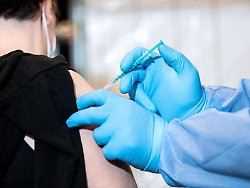Sunday, January 03, 2021
New substances and willingness to vaccinate
How the vaccination rate could increase
For a week now, vaccinations against the corona virus have been in Germany. The criticism of the speed of vaccinations is fierce. But there are several levers to speed up the process over the next few weeks. An overview of how this could be achieved.
Since the vaccinations against Corona began in Germany shortly after Christmas, a bitter debate has raged as to whether the pace is sufficient in view of the high number of new infections. The EU, as well as the federal and state governments, are criticized. The federal government points out that the number of vaccinations will now increase.
Which vaccines does Germany get?
The EU had ordered 200 million vaccine doses from the company Biontech – and in December pulled an existing option for a further 100 million doses. However, these can only be delivered from the expanded production in 2021. According to the Ministry of Health, Germany receives a total of 55.8 million vaccine doses from Biontech and 50.5 million doses from Moderna via the EU. In addition, the federal government has secured a "safe option" from Biontech for a further 30 million cans via a national reference. The prerequisite is likely to be the expansion of production capacities at Biontech. This is considered very likely.
Do other vaccines speed up vaccinations?
A decision by the European approval authority EMA on the vaccine from the company Moderna is expected on January 6th. In addition, the virologist Christian Drosten insists in the "Berliner Morgenpost" that the EMA should also quickly clear the way for the vaccine from Astrazeneca, which is already approved in Great Britain. With the Astrazeneca vaccine – if it is delivered – the vaccination and the vaccination rate in Germany could also accelerate: Because this vaccine does not have to be cooled separately and could therefore also be administered in medical practices. Germany is entitled to an EU share of 56.2 million cans from Astrazeneca.
In addition there are 42 million doses through EU contracts with the German company Curevac, whose vaccine could be approved in the first half of the year. Germany can also obtain 20 million doses through a national program, because the development of vaccines from Curevac and Biontech was funded by tax money. Germany would also purchase a further 37.25 million cans from Johnson & Johnson via the EU.
When is the vaccine coming?
For some time now, Health Minister Jens Spahn has been repeating that Biontech should deliver four million doses by the end of January, and eleven to 13 million doses by the end of March – but two doses must be injected per patient at three-week intervals. There is still uncertainty about the possible delivery dates for the vaccines that have not yet been approved.
Are federal states and municipalities slowing the pace of vaccination?
In federal Germany, the federal government is responsible for purchasing and distributing the vaccine for the federal states. These in turn distribute the vaccine to the cities and municipalities – and regulate differently in each case how the first groups of people get the vaccinations. This includes those over 80 and members of the medical and nursing professions. The problem: As long as there is not enough vaccine available for everyone, there will be selective supply bottlenecks, even if the vaccination centers are ready. The vaccination rate is therefore still low: On January 2nd, the RKI registered another 40,665 people as vaccinated (total: 238,809). The pace will probably increase because, according to the "Berliner Morgenpost", vaccination centers such as the one in Berlin-Treptow have initially secured sufficient vaccines to be able to carry out 600 vaccinations a day.
What about the vaccination readiness?
The goal of protecting society in the pandemic will not only be missed if enough vaccine is not available – but also if too few people are vaccinated. So far, the federal government expects that so-called herd immunity will be achieved if at least 60 percent can be vaccinated. There was hope that this immunity could be achieved in the fall. In view of the rapidly spreading new virus mutation in Great Britain, which is said to be much more contagious, doctors now reckon that the threshold for herd immunity would have to rise to more than 80 percent. In Germany, too, there are reservations about vaccination, which should remain voluntary. The "Spiegel" reported about a lack of willingness to vaccinate nurses at a facility. Bavaria's Prime Minister Markus Söder is also concerned and criticized in the "Bild am Sonntag" that "too many fake news … haunt the network".
Why aren't politicians vaccinated?
The Standing Vaccination Commission has drawn up a list of priorities which the Federal Government largely adheres to and which is based on the risk to people. The problem: In other countries, top politicians have been vaccinated to increase confidence in vaccines. In Germany, the list of priorities has so far prevented what Söder apparently also sees as a problem: He believes that in the near future the heads of the state and the federal states as well as other public figures will have to set a good example as role models.
. (tagsToTranslate) politics (t) coronavirus (t) Covid-19 (t) vaccination
